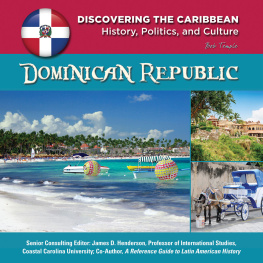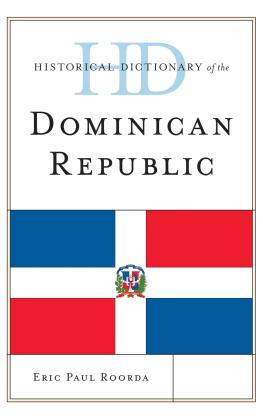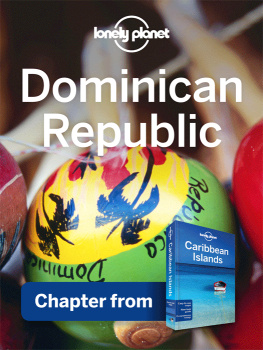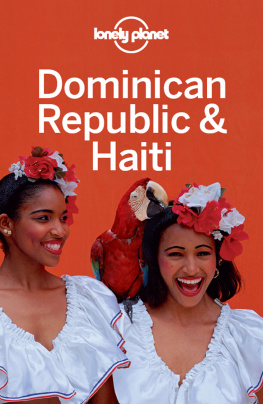A BOOK IN THE SERIES
LATIN AMERICA OTHERWISE: LANGUAGES, EMPIRES, NATIONS
Series editors: Walter D. Mignolo, Duke
University; Irene Silverblatt, Duke
University; Sonia Saldivar-Hull,
University of California
at Los Angeles
DENISE BRENNAN


FOR BELKIS AND NANCY
ix
xi
I I
III III
IV IV

 atin America Otherwise: Languages, Empires, Nations is a critical series. It aims to explore the emergence and consequences of concepts used to define "Latin America" while at the same time exploring the broad interplay of political, economic, and cultural practices that have shaped Latin American worlds. Latin America, at the crossroads of competing imperial designs and local responses, has been construed as a geocultural and geopolitical entity since the nineteenth century. This series provides a starting point to redefine Latin America as a configuration of political, linguistic, cultural, and economic intersections that demands a continuous reappraisal of the role of the Americas in history, and of the ongoing process of globalization and the relocation of people and cultures that have characterized Latin America's experience. Latin America Otherwise: Languages, Empires, Nations is a forum that confronts established geocultural constructions, that rethinks area studies and disciplinary boundaries, that assesses convictions of the academy and of public policy, and that, correspondingly, demands that the practices through which we produce knowledge and understanding about and from Latin America be subject to rigorous and critical scrutiny.
atin America Otherwise: Languages, Empires, Nations is a critical series. It aims to explore the emergence and consequences of concepts used to define "Latin America" while at the same time exploring the broad interplay of political, economic, and cultural practices that have shaped Latin American worlds. Latin America, at the crossroads of competing imperial designs and local responses, has been construed as a geocultural and geopolitical entity since the nineteenth century. This series provides a starting point to redefine Latin America as a configuration of political, linguistic, cultural, and economic intersections that demands a continuous reappraisal of the role of the Americas in history, and of the ongoing process of globalization and the relocation of people and cultures that have characterized Latin America's experience. Latin America Otherwise: Languages, Empires, Nations is a forum that confronts established geocultural constructions, that rethinks area studies and disciplinary boundaries, that assesses convictions of the academy and of public policy, and that, correspondingly, demands that the practices through which we produce knowledge and understanding about and from Latin America be subject to rigorous and critical scrutiny.
Sosua, a town in the Dominican Republic, is a crossroads of personal desires and impersonal forces. European clients in Sosua meet Dominican and Haitian women for paid sex. With sensitivity and compassion, Denise Brennan introduces us to women determined to do more than survive; they have dreams of improving their lives, helping their families, and leaving the D.R. for the excitement and security of Europe. Few do.
This rich and engaging book brings a subtle ethnographic lens to a complex exchange. Sex work is never just about money and sex; it is about hopes, possibilities, and the realities of transnational capitalism and the local structures of class. Forcing us to conceptualize sex work "otherwise," What's Love Got to Do with It? unscrambles the transnational economics of desire and intimacy and shows how sex workers, with few opportunities and fewer resources, strategize to make a way for themselves in a global economy of enduring inequalities.

 am deeply grateful to Dr. Bayardo Gomez and the staff of the Centro de Promocion y Solidaridad Humana (CEPROSH), particularly Hemilce Guerra, Giovanni Ferreira, Miriam de Castro, and Roque Cid. I am also indebted to CEPROSH's peer educators for their willingness to share their time and insights. Belkis Hernandez and Nancy Gomez have been caring and generous friends, as well as talented field assistants who threw themselves into this project. Without their generosity and help, this book would not have been possible. Many thanks as well to Sosua's residents, who have helped me in so many ways over the years. Dear friends Sylvie Papernik and Corey Price, in particular, always looked out for me, and Lisa Brody and her family warmly opened their home to me in Santo Domingo whenever I was in the capital.
am deeply grateful to Dr. Bayardo Gomez and the staff of the Centro de Promocion y Solidaridad Humana (CEPROSH), particularly Hemilce Guerra, Giovanni Ferreira, Miriam de Castro, and Roque Cid. I am also indebted to CEPROSH's peer educators for their willingness to share their time and insights. Belkis Hernandez and Nancy Gomez have been caring and generous friends, as well as talented field assistants who threw themselves into this project. Without their generosity and help, this book would not have been possible. Many thanks as well to Sosua's residents, who have helped me in so many ways over the years. Dear friends Sylvie Papernik and Corey Price, in particular, always looked out for me, and Lisa Brody and her family warmly opened their home to me in Santo Domingo whenever I was in the capital.
So many people have provided comments. I would like to express deep gratitude to Sarah Mahler and to an anonymous reviewer, both of whom spent much time drafting very detailed suggestions; Nina Glick-Schiller, Linda-Anne Rebhun, Ian Condry, Colleen Cotter, Anne Allison, Steve Rubenstein, Yuka Suzuki, Kate Frank, and Penny Saunders have generously provided feedback on different parts of the book. Participants in an anthropology reading groupWalter Armbrust, Jean-Paul Dumont, Mark Ingram, Gwen Mikell, Sylvia Onder, Joanne Rappaport, and Susan Terrio-also have given me valuable comments. Ongoing dialogues with fellow sex worker rights advocates Kathy Moon, Ann Jordan, Melanie Orhant, Penny Saunders, and Elizabeth Bernstein have helped me make sense of the sex trade in Sosua.
My colleagues at Georgetown University, in the Department of Sociology and Anthropology and in the Women's Studies Program, have provided me with a supportive work environment. Denise Goitia, Beth Hallowell, Kristen Saad, and Sabra Thorner have been dedicated, creative, and inspiring research assistants. I am particularly grateful to Beth, who, always energetic and thorough, helped me with the final stages of the book. Sarah Aponte at the Dominican Studies Institute has, on many occasions, helped me track down Dominican resources, and Ana Aparicio lent a hand with the glossary. Mark Padilla has answered many a query on the sex industry in the Dominican Republic. I am grateful to the following funding sources: the Georgetown Summer Academic Grant, Georgetown Competitive Grant-in-Aid, Georgetown Junior Faculty Fellowship, Fulbright Fellowship Program, Yale Center for International Area Studies Summer Research Grant, and Andrew W Mellon Pre-Dissertation Field Research Grant. This project began under the tutelage of Patricia Pessar, Marc Edelman, and Hal Scheffler, the most supportive and insightful advisors a graduate student could hope for. I owe a mountain of debt to Patricia, who has inspired me on so many levels and who gave so much to this project over the years. This project finished up under the editorial eye of Valerie Millholland, who, with the help of Miriam Angress and Kate Lothman, has showed tireless dedication to its publication. Thanks.
Finally, dear friend Marybeth McMahon read and commented on the book with great enthusiasm and skill. My parents, Mary and Arthur Brennan, have been endlessly supportive and have provided loving child care. Emily and James have been patient, expecting to see "the book" at every turn, in every bookstore. And I do not know how this book would have been done without the patience, encouragement, and editorial talents of my husband, Doug. In him I have found a true partner.
Last, I have been fortunate to spend my days listening to the stories of such courageous women. I cannot imagine a more rewarding job. I owe them many, many thanks for sharing so much with me.












 atin America Otherwise: Languages, Empires, Nations is a critical series. It aims to explore the emergence and consequences of concepts used to define "Latin America" while at the same time exploring the broad interplay of political, economic, and cultural practices that have shaped Latin American worlds. Latin America, at the crossroads of competing imperial designs and local responses, has been construed as a geocultural and geopolitical entity since the nineteenth century. This series provides a starting point to redefine Latin America as a configuration of political, linguistic, cultural, and economic intersections that demands a continuous reappraisal of the role of the Americas in history, and of the ongoing process of globalization and the relocation of people and cultures that have characterized Latin America's experience. Latin America Otherwise: Languages, Empires, Nations is a forum that confronts established geocultural constructions, that rethinks area studies and disciplinary boundaries, that assesses convictions of the academy and of public policy, and that, correspondingly, demands that the practices through which we produce knowledge and understanding about and from Latin America be subject to rigorous and critical scrutiny.
atin America Otherwise: Languages, Empires, Nations is a critical series. It aims to explore the emergence and consequences of concepts used to define "Latin America" while at the same time exploring the broad interplay of political, economic, and cultural practices that have shaped Latin American worlds. Latin America, at the crossroads of competing imperial designs and local responses, has been construed as a geocultural and geopolitical entity since the nineteenth century. This series provides a starting point to redefine Latin America as a configuration of political, linguistic, cultural, and economic intersections that demands a continuous reappraisal of the role of the Americas in history, and of the ongoing process of globalization and the relocation of people and cultures that have characterized Latin America's experience. Latin America Otherwise: Languages, Empires, Nations is a forum that confronts established geocultural constructions, that rethinks area studies and disciplinary boundaries, that assesses convictions of the academy and of public policy, and that, correspondingly, demands that the practices through which we produce knowledge and understanding about and from Latin America be subject to rigorous and critical scrutiny. am deeply grateful to Dr. Bayardo Gomez and the staff of the Centro de Promocion y Solidaridad Humana (CEPROSH), particularly Hemilce Guerra, Giovanni Ferreira, Miriam de Castro, and Roque Cid. I am also indebted to CEPROSH's peer educators for their willingness to share their time and insights. Belkis Hernandez and Nancy Gomez have been caring and generous friends, as well as talented field assistants who threw themselves into this project. Without their generosity and help, this book would not have been possible. Many thanks as well to Sosua's residents, who have helped me in so many ways over the years. Dear friends Sylvie Papernik and Corey Price, in particular, always looked out for me, and Lisa Brody and her family warmly opened their home to me in Santo Domingo whenever I was in the capital.
am deeply grateful to Dr. Bayardo Gomez and the staff of the Centro de Promocion y Solidaridad Humana (CEPROSH), particularly Hemilce Guerra, Giovanni Ferreira, Miriam de Castro, and Roque Cid. I am also indebted to CEPROSH's peer educators for their willingness to share their time and insights. Belkis Hernandez and Nancy Gomez have been caring and generous friends, as well as talented field assistants who threw themselves into this project. Without their generosity and help, this book would not have been possible. Many thanks as well to Sosua's residents, who have helped me in so many ways over the years. Dear friends Sylvie Papernik and Corey Price, in particular, always looked out for me, and Lisa Brody and her family warmly opened their home to me in Santo Domingo whenever I was in the capital.